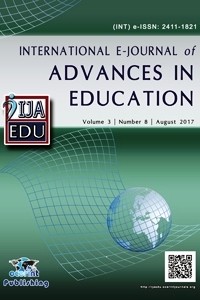
International E-Journal of Advances in Education
Yazarlar: Nurgül IŞIK
Konular:Eğitim, Eğitim Araştırmaları
DOI:10.18768/ijaedu.593479
Anahtar Kelimeler:Learning styles,Attitudes,Second language learning,CALL
Özet: The main purpose of the study is to determine the correlation between learning styles of students and their attitudes toward computer-assisted language learning (CALL). Given the importance on the role of learning styles and students’ attitudes toward computer-assisted language learning, the current study seeks to explore, in more detail, second language learners’ perspectives on this issue by asking the following questions:1.What is the correlation between learning styles of students and their attitudes toward CALL? 2.What is the difference between ESL/EFL learners in terms of their attitudes toward second language learning and CALL? The research sample was chosen with the snowball sampling method from the United States and Turkey without looking at their individual differences. All of the 50 participants in the sample were second language learners. For data analysis, Cohen, Oxford, and Chi’s (2002) multi-dimensional Learning Style Survey (LSS) and Min’s (1998) Attitude Toward CALL Questionnaire was used in the study. As a result of the study, a positive scale moderately significant relationship was determined between extroverted and inductive learning styles of students, and their attitudes toward second language learning. It is also concluded that the inductive and reflective learning style was moderately correlated with their attitude toward second language learning with computers. In addition, it was found that there was a significant difference between the attitudes of ESL language learners and EFL language learners. In line with this study’s findings, further study may be done especially on deductive and inductive learning styles in order to understand how they affect language learning. Other further research focus may be on the differences between ESL and EFL learners so as to find out their motivation to learn a language with computers.